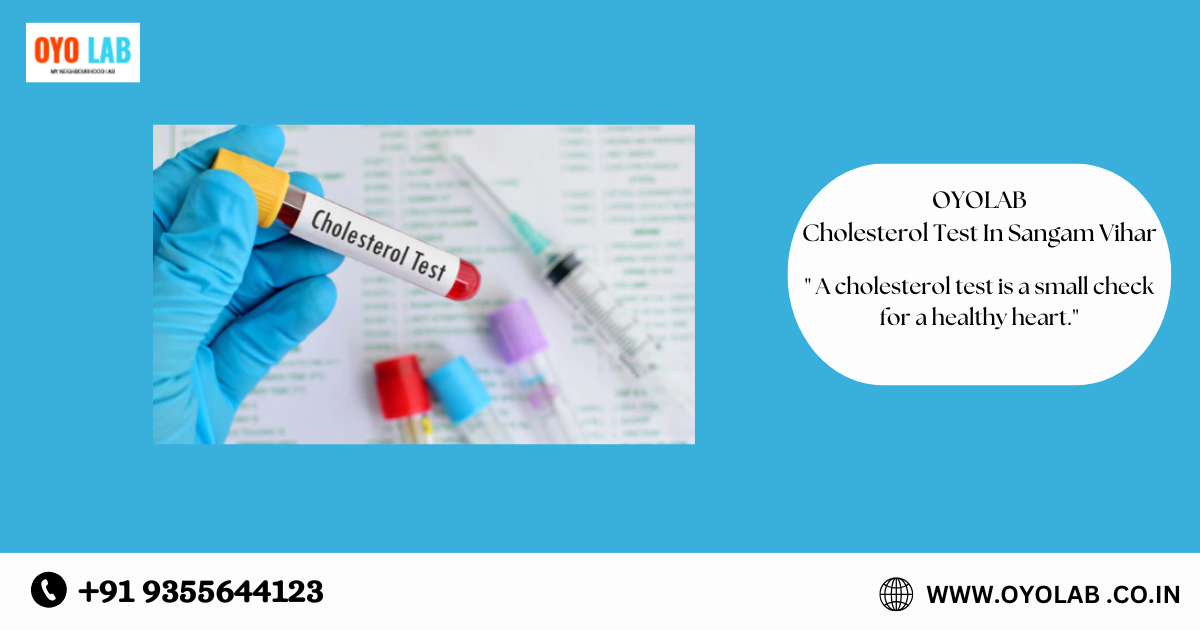
Cholesterol Test In Sangam Vihar
By Shilpa | February 27, 2025
What Is Cholesterol Test ?
A cholesterol test , also called a lipid panel or lipid profile, is a blood test that measures the levels of different types of cholesterol and fats in your blood. It helps assess your risk of heart disease and other health conditions. Doctors recommend cholesterol testing every 4–6 years for healthy adults or more frequently for those at risk.
Importance Of Cholesterol Test
A cholesterol test is essential for maintaining heart health and preventing serious medical conditions. Here’s why it is important:
1. Detects High Cholesterol Early
- High cholesterol often has no symptoms but can lead to serious heart problems.
- Early detection helps in taking preventive measures before complications arise.
2. Prevents Heart Disease & Stroke
- High LDL ("bad") cholesterol can cause artery blockages, leading to heart attacks and strokes.
- A cholesterol test helps assess cardiovascular risk and take action in time.
3. Monitors Overall Heart Health
- Helps track triglyceride levels, which can increase the risk of heart disease.
- Encourages a heart-healthy lifestyle with proper diet and exercise.
4. Supports Management of Chronic Conditions
- Essential for people with diabetes, high blood pressure, obesity, or thyroid disorders.
- Helps doctors adjust treatment plans for better health outcomes.
5. Guides Lifestyle & Medication Decisions
- Determines if lifestyle changes alone can control cholesterol or if medication is needed.
- Helps track progress after adopting a healthier diet and exercise routine.
6. Reduces Risk of Other Health Issues
- High cholesterol is linked to liver disease, kidney disease, and metabolic disorders.
- A test can provide early warnings for these conditions.
Benefits Of Cholesterol Test
A cholesterol test provides valuable insights into your heart health and overall well-being. Here are the key benefits:
1. Early Detection of High Cholesterol
- High cholesterol often has no symptoms, so testing helps catch it early.
- Prevents serious conditions like heart disease and stroke before they develop.
2. Helps Prevent Heart Disease & Stroke
- Identifies high LDL ("bad" cholesterol) that can clog arteries.
- Encourages timely lifestyle changes or medication to lower heart disease risk.
3. Tracks Overall Heart Health
- Measures triglyceride levels, which, if high, can increase heart disease risk.
- Helps monitor heart health for those with a family history of cardiovascular disease.
4. Assists in Managing Chronic Conditions
- Essential for people with diabetes, obesity, hypertension, or thyroid disorders.
- Helps doctors create personalized treatment plans for better health management.
5. Guides Lifestyle and Dietary Changes
- Helps determine if lifestyle changes (healthy diet, exercise) are enough to control cholesterol.
- Encourages healthier eating habits and regular physical activity.
6. Evaluates the Need for Medication
- Helps doctors decide if cholesterol-lowering medications (like statins) are necessary.
- Monitors the effectiveness of prescribed treatments.
7. Improves Long-Term Health
- Reduces the risk of other complications like liver and kidney disease.
- Encourages overall wellness by promoting heart-conscious habits.